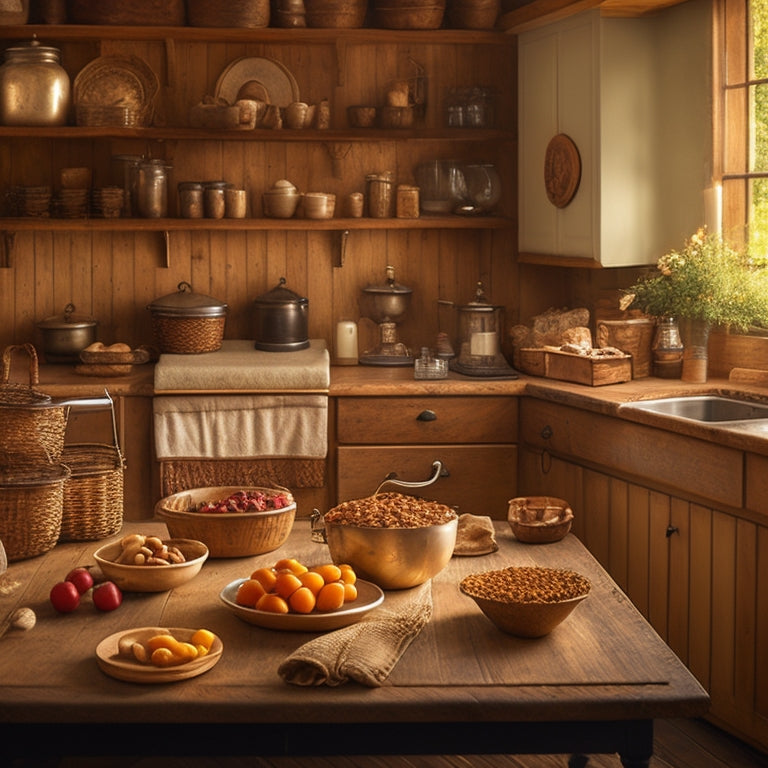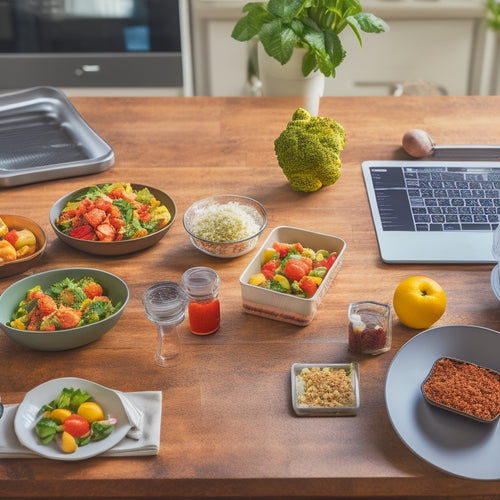
Crabill's Cottage Food Business Secrets Revealed
Share
I've trudged through the cottage food industry's landmines, and I'm not about to sugarcoat the realities. Launching a venture without grasping the laws, regulations, and expert insights is a recipe for disaster. David Crabill's expertise is invaluable, and I've learned that avoiding legal headaches is key. Low startup costs and flexibility are great, but conquering common challenges like limited production capacity and health regulations is essential. Now, I'm not going to give away all the secrets just yet, but let's just say that perfecting recipes, crafting a unique brand voice, and establishing a financial plan are just the beginning of the journey to success - and that's where things get really interesting.
Key Takeaways
• Understanding cottage food laws and regulations is crucial for compliance and avoiding legal headaches.
• Researching the market thoroughly helps create products that meet customer needs and ensures sustainable business growth.
• Developing a marketing strategy, including identifying the target audience and crafting a unique brand voice, is vital for success.
• Perfecting recipes, sourcing high-quality ingredients, and investing in professional packaging helps create a competitive edge.
• Establishing a budget, setting prices strategically, and projecting revenue ensures financial sustainability and growth.
Navigating Cottage Food Laws
Before diving headfirst into the world of cottage food businesses, I'd better get familiar with the rules of the game, because let's face it, understanding cottage food laws can be a regulatory nightmare if you're not prepared.
I mean, who wants to get shut down by the authorities before even getting started? Not me. That's why I'm taking the time to research the Cottage Food Act and its varying state regulations.
I'm starting small, focusing on direct sales to consumers, and building my brand from the ground up. I'm not trying to be a hero, but I do want to avoid any potential legal headaches.
Benefits of Cottage Food Businesses
Now that I've got the regulatory hurdles out of the way, I can finally focus on the good stuff - the benefits of running a cottage food business, which, let's be real, are the real motivator behind taking on this venture in the first place.
The low startup costs and flexibility in working hours are a dream come true for anyone who's tired of the 9-to-5 grind.
And let's not forget the opportunity to test products in the market and refine my marketing strategies before scaling up.
I can develop products that truly resonate with my target audience, and with high-profit margins, I can actually make a living doing what I love.
It's a chance to start small, grow gradually, and build a brand that's truly mine.
Overcoming Common Challenges
My cozy cottage food operation quickly turned into a logistical nightmare, with limited production capacity, compliance with health and safety regulations, and marketing woes threatening to derail my entrepreneurial dreams. I mean, who doesn't love the idea of baking cookies all day and selling them to adoring fans?
But, reality check: it's not all sugar and spice. To overcome these challenges, I'd to get real about my marketing strategies. I started by testing my products on friends, family, and even strangers (don't judge) to get honest feedback. I also invested time in crafting a solid brand identity and social media presence to reach my target customers.
It's not easy, but with persistence and adaptability, I've learned to navigate these obstacles and turn my cottage food business into a thriving venture.
Launching Your Cottage Food Venture
As I stood in my cramped kitchen, surrounded by mixing bowls and recipes, I realized that launching my cottage food venture would require more than just a passion for baking - it would demand a solid business plan, a keen understanding of local regulations, and a healthy dose of entrepreneurial grit.
Here are the essential steps I took to get started:
- Developed a marketing strategy:
- Identified my target audience.
- Crafted a unique brand voice.
- Created a social media plan to engage with customers.
- Focused on product development:
- Perfected my recipes.
- Sourced high-quality ingredients.
- Invested in professional packaging to stand out in the market.
- Created a financial plan:
- Established a budget.
- Set prices.
- Projected revenue to secure my venture's financial sustainability.
Expert Insights From David Crabill
With over a decade of experience in the cottage food industry, David Crabill has seen it all - the triumphs, the failures, and the regulatory headaches that can make or break a startup. As I look back, I realize that business growth isn't just about scaling up production, it's about understanding your market inside out. That's why I stress the importance of market research.
Don't assume you know what your customers want; do your necessary diligence and find out. I've seen too many cottage food entrepreneurs sink their life savings into a product that nobody wants. Don't be that person. Take the time to research, test, and refine your product. It's the only way to ensure sustainable business growth and avoid the pitfalls that can cripple your startup.
Frequently Asked Questions
Can I Sell Cottage Food Products at Local Farmers' Markets?
"Ugh, selling at farmers' markets? Please, it's not that easy. I need to research the competition, perfect my pricing strategies, and nail my packaging design and branding techniques to stand out in that crowded market."
How Do I Obtain Necessary Licenses and Permits for My Business?
'Rome wasn't built in a day,' and neither was my cottage food business - I'm still maneuvering the license application process and permit requirements, which are a bureaucratic nightmare, but necessary evils to legitimize my operation.
What Kind of Insurance Do I Need for a Cottage Food Business?
Ugh, fine. For my cottage food business, I need insurance that covers liability in case someone sues me for food poisoning, and also protects my business property, like equipment and inventory, from damage or theft.
Can I Hire Employees to Help With Production and Sales?
Ugh, fine, I'll hire help, but I'll have to manage the hiring process, train them myself, and deal with staff management and performance evaluations - all while maintaining control, because let's face it, no one does it better than me.
How Do I Handle Customer Refunds and Complaints?
"Handling customer refunds and complaints is like trying to put out a fire with gasoline - it's a delicate dance. I tackle it head-on by responding promptly, offering solutions, and killing them with kindness, all while keeping a keen eye on customer satisfaction strategies to avoid future fires."
Related Posts
-

Budget-Friendly Meal Prep Made Easy With Digital Tools
You're just a few clicks away from effortless meal prep that fits your budget. Digital tools like meal prep planners ...
